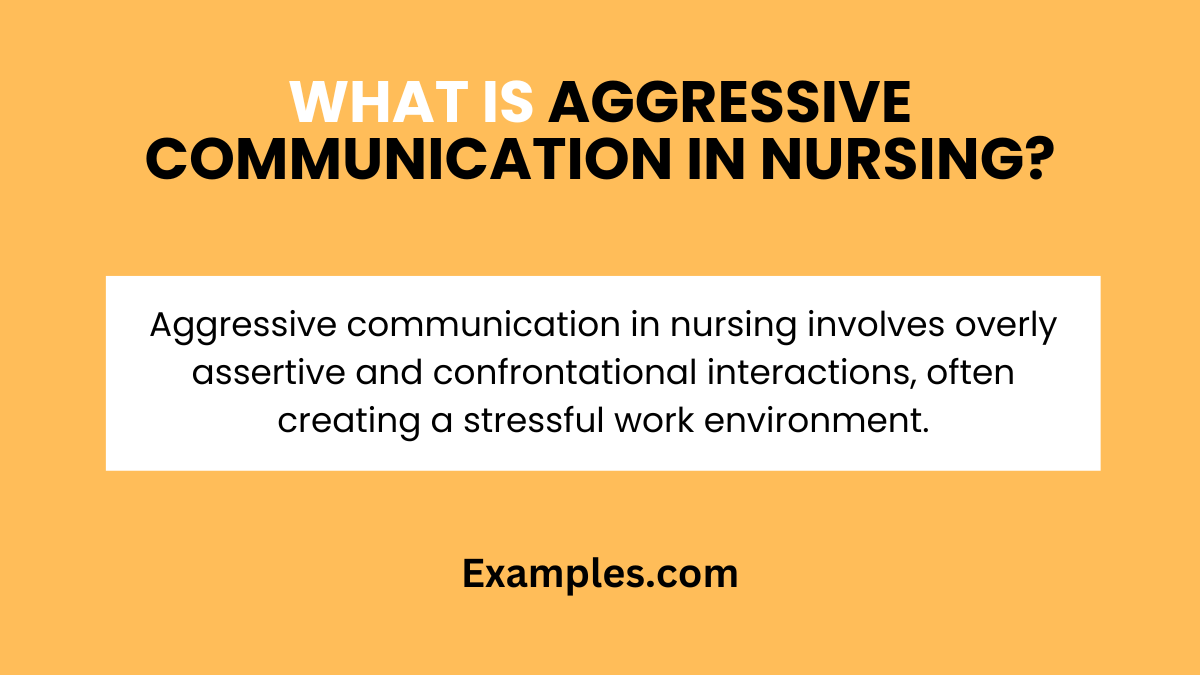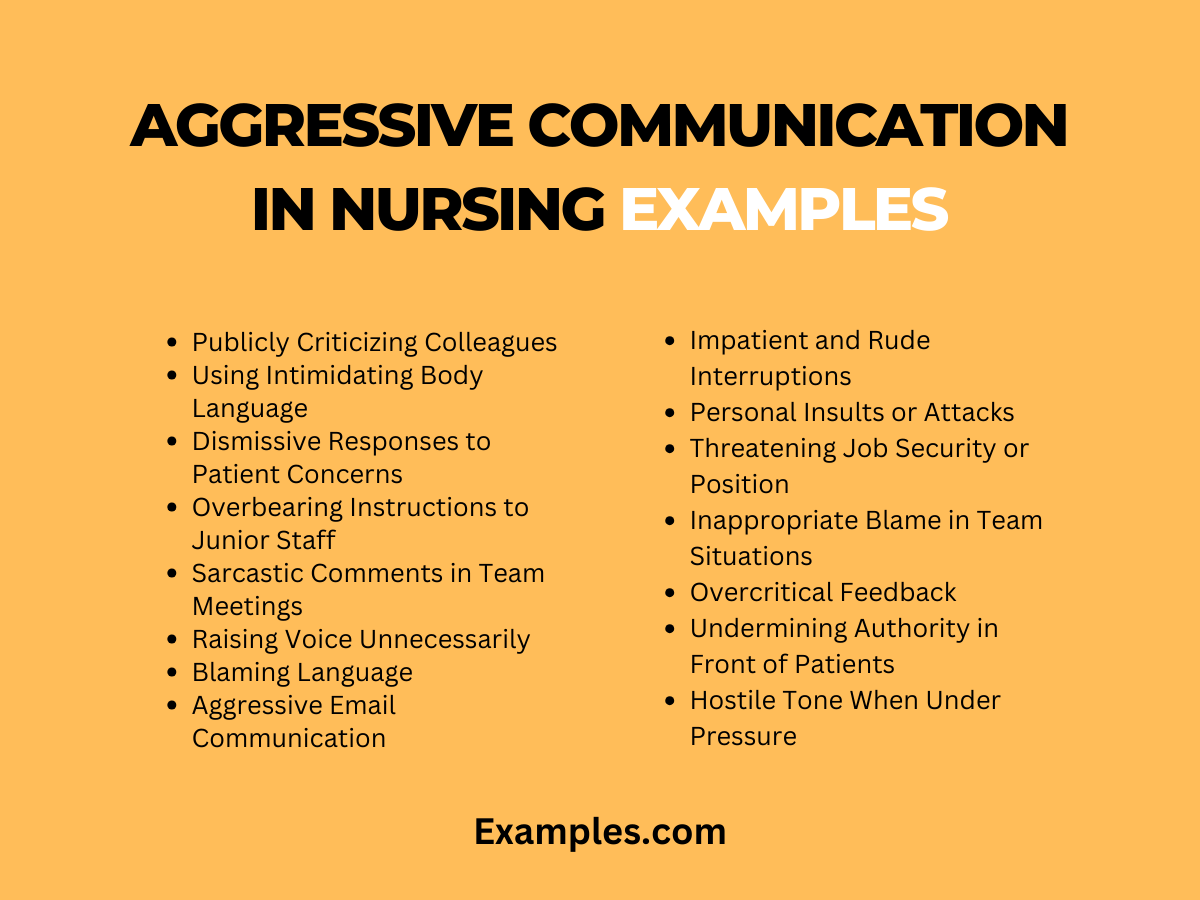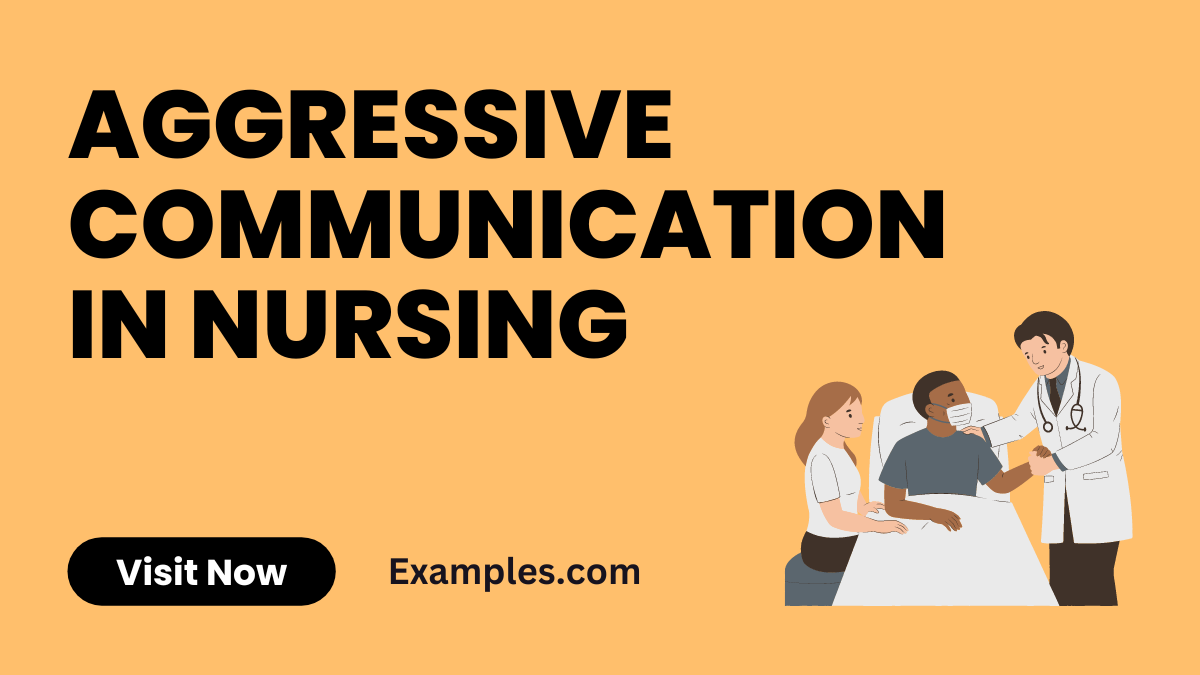14+ Aggressive Communication in Nursing Examples
This comprehensive guide delves into the often-overlooked issue of Aggressive Communication in Nursing, offering insightful examples and effective coping strategies. Aggressive communication can significantly impact the dynamics within healthcare settings, affecting both staff and patient care. By contrasting these examples with a Passive communication approach, this guide aims to promote more empathetic, understanding, and Effective Communication in nursing. It’s an essential read for healthcare professionals who wish to foster a more positive and supportive environment in their practice, enhancing both patient care and workplace morale.
What is Aggressive Communication in Nursing?

Aggressive Communication in Nursing refers to interactions where nurses or other healthcare professionals engage in overly assertive, dominating, or confrontational communication. This can manifest through verbal or Nonverbal Communication, and often leads to a stressful and unproductive work environment.
15 Aggressive Communication in Nursing Examples

This section showcases 15 examples of Aggressive Communication in Nursing, highlighting how such interactions can negatively impact the healthcare environment. These examples are crucial for understanding the diverse forms of aggressive communication and their effects on patient care, team dynamics, and overall workplace health. From verbal outbursts to nonverbal displays of frustration, these scenarios underscore the importance of recognizing and addressing aggressive behaviors to maintain Effective Communication and ensure a supportive and professional nursing environment.
- Publicly Criticizing Colleagues: Reprimanding fellow nurses or staff in front of others, undermining their credibility.
Example: “You always make these mistakes; can’t you do anything right?” - Using Intimidating Body Language: Standing too close or using threatening gestures during conversations.
Example: Leaning over a colleague while aggressively questioning their decision. - Dismissive Responses to Patient Concerns: Responding to patients’ questions or worries in a curt, unconcerned manner.
Example: “That’s not something you need to worry about; just focus on getting better.” - Overbearing Instructions to Junior Staff: Issuing orders in an authoritarian manner without room for discussion.
Example: “Do it my way; I don’t care how you’ve been trained.” - Sarcastic Comments in Team Meetings: Using sarcasm to belittle colleagues’ ideas or questions.
Example: “Sure, that’s a brilliant idea, just like all your others.” - Raising Voice Unnecessarily: Speaking loudly to dominate conversations or to express frustration.
Example: “I need these reports now! Can’t anyone here listen?” - Blaming Language: Assigning blame to others without understanding the full context.
Example: “This is all your fault; you’ve jeopardized the patient’s health!” - Aggressive Email Communication: Sending emails with a harsh, commanding tone.
Example: “This is unacceptable; I expect better performance immediately!” - Impatient and Rude Interruptions: Cutting off patients or staff mid-sentence.
Example: Interrupting a patient explaining their symptoms, “Yeah, yeah, I’ve heard enough. - Personal Insults or Attacks: Directly attacking someone’s character or professionalism.
Example: “You’re just too incompetent to be in this profession.” - Threatening Job Security or Position: Using position power to intimidate others.
Example: “If you don’t improve, I’ll see to it that you’re transferred.” - Inappropriate Blame in Team Situations: Blaming the whole team for individual mistakes.
Example: “Because of your incompetence, our entire team looks bad!” - Overcritical Feedback: Giving feedback in a demeaning, non-constructive manner.
Example: “Your technique is all wrong; I don’t know how you passed nursing school.” - Undermining Authority in Front of Patients: Criticizing colleagues’ decisions in front of patients.
Example: “I don’t know why they did that; it’s not how I would handle your case.” - Hostile Tone When Under Pressure: Adopting a harsh tone during high-stress situations.
Example: “Just get out of my way; I’ll handle it since you can’t cope!”
How to Improve Aggressive Communication in Nursing?

Improving Aggressive Communication in nursing is pivotal for creating a more effective, empathetic, and patient-centered healthcare environment. Here are strategies to transform aggressive communication into a more Passive and constructive style:
- Encourage Active Listening: Nurses should practice active listening, which involves giving full attention to the speaker and acknowledging their message. This approach not only shows respect but also enhances Understanding and Patient Care.
- Foster Empathy: Developing empathy helps in appreciating others’ perspectives. For nurses, understanding patients’ or colleagues’ viewpoints can significantly improve the way they communicate, making interactions more Compassionate and Effective.
- Use Reflective Speaking: Reflective speaking involves paraphrasing what the other person has said to demonstrate understanding. This technique can be particularly effective in de-escalating aggressive scenarios and ensuring Clear Communication.
- Promote Calm Responses: In stressful situations, taking a moment before responding can help maintain composure. Encouraging a culture where calm responses are the norm can significantly reduce workplace aggression and improve Team Dynamics.
- Training and Workshops: Regular training sessions and workshops on Communication Skills can equip nursing staff with the tools to communicate assertively yet respectfully, avoiding aggressive tones while still being effective.
How Does Aggressive Communication Affect Nurse-Patient Relationships?

Aggressive communication in nursing can have profound impacts on nurse-patient relationships, which are essential for effective healthcare delivery:
- Erodes Trust: Aggressive communication can erode the trust that patients place in their healthcare providers. Trust is a cornerstone of Effective Patient Care, and without it, the nurse-patient relationship suffers.
- Increases Patient Anxiety: Patients who encounter aggressive communication from nurses may experience increased anxiety and stress, which can adversely affect their overall health and recovery process.
- Hinders Open Communication: Patients may feel intimidated and less likely to share vital information about their symptoms or concerns if they anticipate an aggressive response. This hinders Transparent Communication, which is crucial for accurate diagnosis and treatment.
- Impacts Patient Satisfaction: Aggressive communication often leads to lower patient satisfaction. Patients who feel respected and understood are more likely to rate their care positively, affecting the overall perception of the healthcare facility.
- Leads to Compliance Issues: Patients who do not feel heard or respected may be less likely to comply with medical advice or treatment plans, potentially impacting their health outcomes. Effective communication is key to ensuring Patient Compliance and successful healthcare outcomes.
This article on Aggressive Communication in Nursing highlights crucial strategies for recognizing and addressing aggressive behaviors in healthcare settings. By shifting towards more empathetic, patient-centered communication styles, nursing professionals can significantly improve patient care, enhance workplace harmony, and foster stronger nurse-patient relationships. Embracing these changes is essential for creating a supportive, respectful, and effective healthcare environment.



